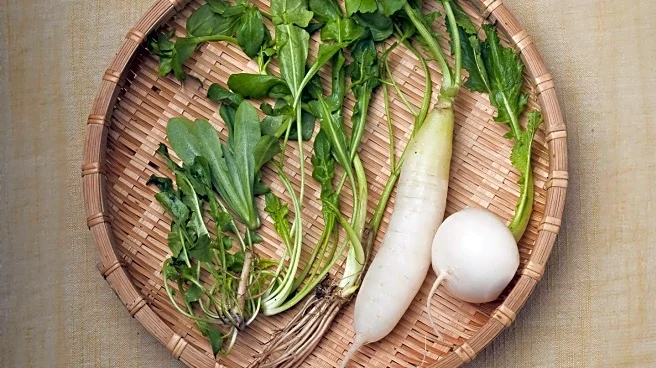What is the story about?
What's Happening?
Iris Phoebe Weaver, a Massachusetts-based herbalist and foraging instructor, is witnessing a revival in the interest of foraging, a practice that dates back to before the advent of agriculture. Weaver conducts nature walks to educate people on the culinary and medicinal uses of wild plants, such as dandelions. The trend is gaining traction as individuals seek budget-friendly and environmentally conscious food sources. Foraging is becoming popular among various demographics, including young adults and older couples, as noted by Gina Buelow from Iowa University Extension Program. Chefs like Evan Mallett of Black Trumpet Bistro in Portsmouth, New Hampshire, are incorporating foraged ingredients into their menus, enhancing the dining experience with local and exotic flavors.
Why It's Important?
The resurgence of foraging reflects a growing interest in sustainable and local food sources, which can have significant environmental benefits. By reducing reliance on industrial agriculture, foraging can help decrease carbon footprints and promote biodiversity. Additionally, the practice supports local economies by encouraging the use of regional ingredients in restaurants. Foraging also offers a creative outlet for individuals, fostering a deeper connection with nature and enhancing culinary innovation. As more people engage in foraging, there is potential for increased awareness and education on sustainable practices, benefiting both communities and ecosystems.
What's Next?
As interest in foraging continues to grow, educational programs and workshops are likely to expand, providing more opportunities for individuals to learn safe and sustainable foraging techniques. Restaurants may increasingly feature foraged ingredients, appealing to consumers seeking unique and locally sourced dishes. The trend could also inspire policy changes, encouraging the protection of natural habitats and the promotion of sustainable food practices. Stakeholders, including environmental groups and culinary professionals, may collaborate to further integrate foraging into mainstream food culture.
Beyond the Headlines
Foraging not only impacts culinary practices but also raises ethical and legal considerations regarding land use and conservation. As the practice becomes more popular, there may be discussions on the rights to forage on public and private lands, necessitating clear guidelines and regulations. Additionally, the cultural significance of foraging, as a means of reconnecting with ancestral practices, may lead to a broader appreciation of indigenous knowledge and traditions.

















